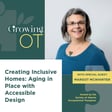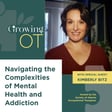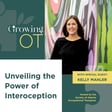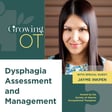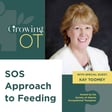
On executive functioning skills for adults and children with Dr. Peg Dawson
In this episode, we're going to dive into what's important about executive functioning and why this is an area that we as OTs need to learn more about. We're very fortunate today to have the opportunity to have a conversation with Dr. Peg Dawson. She has over 40 years of experience as a psychologist in clinical practice and has worked with thousands of children and teens who struggle at home and in school.
She and her colleague, Dr. Richard Guare, have written numerous books about executive skills, some of which you'll recognize as Smart But Scattered and Smart But Scattered Teens.
Dr. Dawson is also a recipient of the National Association of School Psychologist's Lifetime Achievement Award.
You can learn more about Dr. Dawson at smartbutscatteredkids.com.
Jump through this episode using our timestamped chapters:
(00:00) Welcome Remarks
(00:30) Introducing Dr. Peg Dawson
(01:19) Peg's background and journey
(04:15) Leaders in the field of executive skills
(05:17) Brief assessment
(07:19) What executive functioning is and why it's so important
(10:20) Are there certain skills that kids or adults usually have greater issues with than others?
(13:34) Goal setting for children
(16:58) Goal setting in adults
(18:40) How to approach task initiation in adults
(20:58) Learning disorders and executive skills
(23:13) The challenge with using standardize test for measuing executive skills
(26:29) Recommendations for OTs specifically to learn more about executive skills
(28:00) How occupational therapy can help support excecutive skills
(29:43) Upcoming research in the area of executive skills
(31:50) Connecting with Dr. Peg Dawson
(32:28) About the SAOT workshops
(37:08) Rapid fire questions
